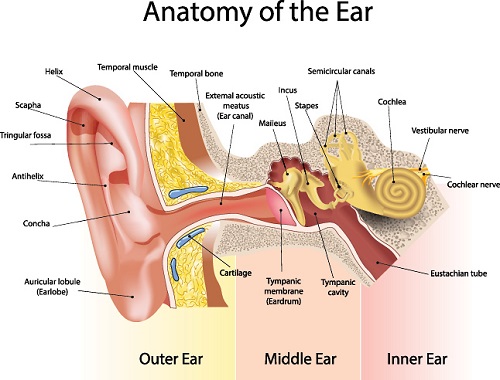Cracking the Code: New Insights into the Genetics of Hearing Loss

Approximately 5% of the world's population is affected by hearing loss (HL). Non-syndromic recessive hearing loss (NSRHL) genes code for proteins that are found in tissues throughout the body1. Even though several thousands of genes are involved in the proper development and functioning of the inner ear neurosensory epithelia, variations in the NSRHL gene directly impede the complex inner ear sensory process, leading to hearing deficits1,2.
Clinicians at the University of Maryland Medical Center (UMMC) in collaboration with investigators in various cities in Pakistan created a comprehensive program to study these genes in Pakistani families. Projects by design identify new genetic variants and characterize their roles in pathways that contribute to hearing loss. A recent study published by the UMMC-led group in the journal, Biomed Research International, utilized whole exome sequencing (WES) to identify causative genes in large consanguineous Pakistani families with the HL phenotype. This population is optimal for the study of hearing disorders given the relative abundance of consanguineous marriages in certain regions of Pakistan, a practice that contributes to a high prevalence of recessive inherited disorders like hearing loss.
Further supporting the widespread relevance of this project is the fact that many of the hearing loss genes found in these Pakistani families are also found in other populations around the world. For example, mutations in seven of the twenty most prevalent NSRHL genes among Caucasians were first discovered in Pakistani families. In addition, 34 of the 72 known NSRHL genes were first discovered in Pakistani families, and variations in these genes later led to the discovery of responsibility for deafness in populations from North America, Europe, North and Sub-Saharan Africa, East Asia, Mexico, and the Middle East.
Saima Riazuddin, PhD, MPH, MBA, Professor of Otorhinolaryngology and Biochemistry, and Co-Director for Academic Development in the Department of Biochemistry and Molecular Biology at the University of Maryland School of Medicine, is one of the primary investigators on this study. Her team works closely to coordinate research efforts around various sites in the US and Pakistan. In a recent interview, Dr. Riazuddin highlighted the importance of this study for improving the understanding of the pathology of hearing loss worldwide. She says, "Our study will not only improve the genetic diagnosis of hearing loss for individuals of Pakistani descent but will also provide knowledge that can be helpful for all patients visiting UMMC clinics."
Genetic counseling is increasingly important for patients in identifying and isolating troublesome genes passed down through generations. This study makes meaningful contributions and provides additional information that can improve molecular diagnostics and genetic counseling for families with significant histories of prelingual hearing loss. UMMC leverages immediate access to the most recent insights in congenital hearing loss and a team of clinicians and counselors that provide the best care, expertly guiding patients and their families through this journey.
To refer a patient, please call 1-800-373-4111.
References:
- Noman M, Bukhari SA, Tahir M, Ali S. A Comprehensive Review on Inherited Sensorineural Hearing Loss and Their Syndromes. Preprints. 202008.0308.v1. Published 2020 August 14. doi:10.20944/2020/080308
- Mahmood U, Bukhari SA, Ali M, Ahmed ZM, Riazuddin S. Identification of Hearing Loss-Associated Variants of PTPRQ, MYO15A, and SERPINB6 in Pakistani Families. Biomed Res Int. 2021;2021:5584788. Published 2021 Apr 24. doi:10.1155/2021/5584788
